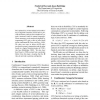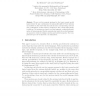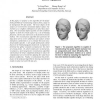6 search results - page 1 / 2 » A Logical Basis for the D Combinator and Normal Form in CCG |
ACL
2008
13 years 6 months ago
2008
The standard set of rules defined in Combinatory Categorial Grammar (CCG) fails to provide satisfactory analyses for a number of syntactic structures found in natural languages. T...
TABLEAUX
2009
Springer
13 years 11 months ago
2009
Springer
We see cut-free sequent systems for the basic normal modal logics formed by any combination the axioms d, t, b, 4, 5. These systems are modular in the sense that each axiom has a c...
AIML
2006
13 years 6 months ago
2006
We see a systematic set of cut-free axiomatisations for all the basic normal modal logics formed by some combination the axioms d, t, b, 4, 5. They employ a form of deep inference ...
SMI
2007
IEEE
13 years 11 months ago
2007
IEEE
In this paper, we propose a new algorithm for the fundamental problem of reconstructing surfaces from a large set of unorganized 3D data points. The local shapes of the surface ar...
ICFP
2009
ACM
14 years 5 months ago
2009
ACM
re a popular form of abstract computation. Being more general than monads, they are more broadly applicable, and in parare a good abstraction for signal processing and dataflow co...



